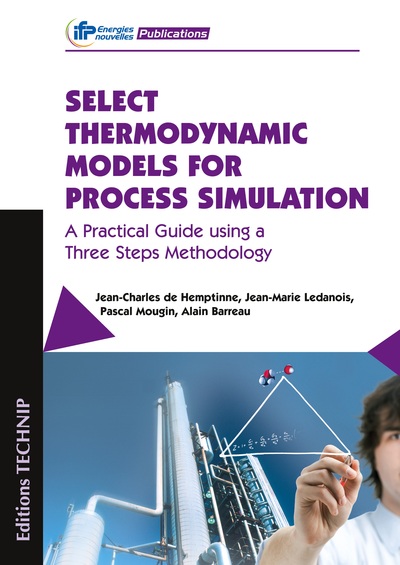Nous utilisons des cookies pour améliorer votre expérience. Pour nous conformer à la nouvelle directive sur la vie privée, nous devons demander votre consentement à l’utilisation de ces cookies. En savoir plus.
Select Thermodynamic Models for Process Simulation
Technip - EAN : 9782710809494
Édition papier
EAN : 9782710809494
Paru le : 1 août 2013
116,00 €
109,95 €
Disponible
Pour connaître votre prix et commander, identifiez-vous
Notre engagement qualité
-
 Livraison gratuite
Livraison gratuite
en France sans minimum
de commande -
 Manquants maintenus
Manquants maintenus
en commande
automatiquement -
 Un interlocuteur
Un interlocuteur
unique pour toutes
vos commandes -
 Toutes les licences
Toutes les licences
numériques du marché
au tarif éditeur -
 Assistance téléphonique
Assistance téléphonique
personalisée sur le
numérique -
 Service client
Service client
Du Lundi au vendredi
de 9h à 18h
- EAN13 : 9782710809494
- Réf. éditeur : 376483
- Editeur : Technip
- Date Parution : 1 août 2013
- Disponibilite : Disponible
- Barème de remise : NS
- Nombre de pages : 412
- Format : H:240 mm L:170 mm E:25 mm
- Poids : 780gr
- Résumé : The selection of the most adequate thermodynamic model in aprocess simulation is an issue that most process engineer has toface sooner or later.This book, conceived as a practical guide, aims at providing adequateanswers by analysing the questions to be looked at. The analysis(first chapter) yields three keys that are further discussed in threedifferent chapters. (1) A good understanding of the propertiesrequired in the process, and their method of calculation is the firstkey. The second chapter provides to that end in a synthetic mannerthe most important equations that are derived from the fundamentalprinciples of thermodynamics. (2) An adequate description of themixture, which is a combination of models and parameters, is thesecond key. The third chapter makes the link between componentsand models, both from a numerical (parameterisation) and physical(molecular interactions) point of view. Finally, (3) a correct view ofthe phase behaviour and trends in regard of the process conditions isthe third key. The fourth chapter illustrates the phase behaviour andmakes model recommendations for the most significant industrialsystems. A decision tree is provided at the end of this chapter. In thelast chapter, the key questions are reviewed for a number of typicalprocesses.This book is intended for process engineers, who are not specialistsof thermodynamics but are confronted with this kind of problems andneed a reference book, as well as process engineering students whowill find an original approach to thermodynamics, complementary oftraditional lectures
- Biographie : Jean-Charles de Hemptinne graduated from the Katholieke Universiteit Leuven (KUL) and owns aPhD from the Massachusetts Institute of Technology (MIT). He obtained a national accreditation toconduct research from Lyon 1 University, and is active at IFP Energies nouvelles since 1991. He is responsibleof the Thermodynamics teaching unit at IFP School and recently was appointed IFP SchoolProfessor and Tuck foundation chair for "Thermodynamics for biofuels".












